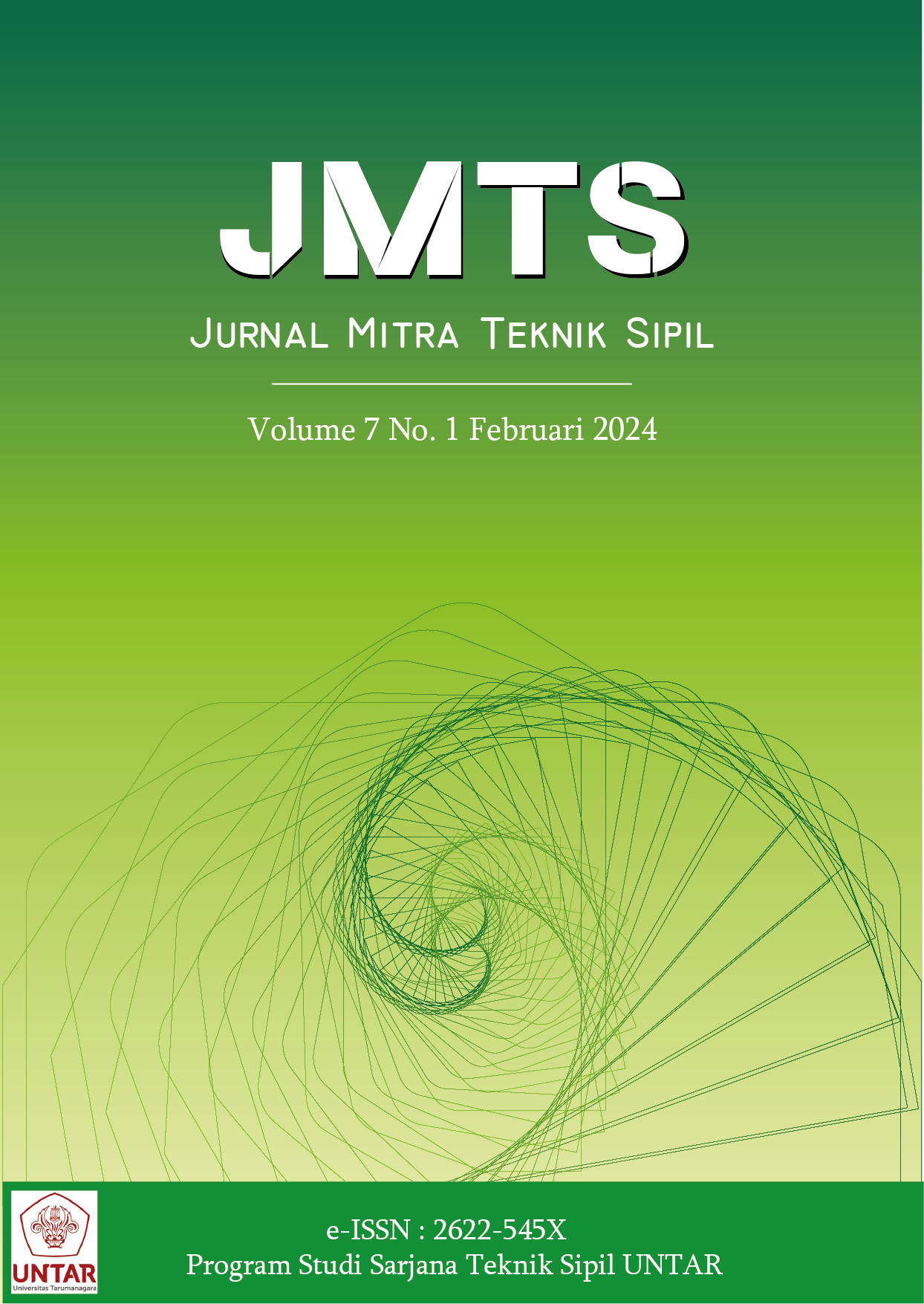ANALISIS FAKTOR PERFORMA DENGAN METODE EARNED SCHEDULE
Main Article Content
Abstract
Every construction project contains a project implementation plan from the beginning to the end of the project. A proven method to determine the estimated project duration is the earned schedule method. Estimated duration with the earned schedule method has to do with 3 (three) types of performance factors. Because there are still few studies that compare the accuracy results of the estimated duration with the earned schedule method using several performance factors. This study uses duration estimates with the earned schedule method with 3 (three) performance factors, namely duration estimates with the plan performance factor method, average performance factors and current period performance factors. The aim is to find out which duration estimate gives the most accurate results. The comparison results of the 3 (three) types of duration estimates are determined using Mean Absolute Percentage Error (MAPE). Duration estimates were performed on late construction projects and construction projects earlier than the estimated time. After conducting the research, it was found that the results of the duration estimate with the plan project performance factor method had the lowest Mean Absolute Percentage Error (MAPE) value. Late finish projects with the plan performance factor method get an average MAPE value of 3.92% while early finish projects get an average MAPE value of 0.420%. The final conclusion is that the duration estimate with the plan performance factor method is the most accurate earned schedule duration estimate.
Abstrak
Setiap proyek konstruksi memuat rencana pelaksanaan proyek dari awal hingga akhir proyek. Metode yang terbukti untuk menentukan perkiraan durasi proyek adalah metode earned schedule. Perkiraan durasi dengan metode earned schedule ada hubungannya dengan 3 (tiga) jenis faktor performa. Karna masih sedikit penelitian yang membandingkan hasil keakurasian dari perkiraan durasi dengan metode earned schedule menggunakan beberapa faktor performa. Penelitian ini menggunakan perkiraan durasi dengan metode earned schedule dengan 3 (tiga) faktor performa, yaitu perkiraan durasi dengan metode faktor performa rencana, faktor performa rata-rata dan faktor performa periode saat ini. Tujuan untuk mengetahui perkiraan durasi mana yang memberikan hasil paling akurat. Hasil perbandingan dari 3 (tiga) jenis perkiraan durasi ditentukan dengan menggunakan Mean Absolute Percentage Error (MAPE). Perkiraan durasi dilakukan pada proyek pembangunan terlambat dan proyek pembangunan lebih awal dari waktu pekiraan. Setelah melakukan penelitian, ditemukan bahwa hasil perkiraan durasi dengan metode faktor performa proyek rencana memiliki perolehan nilai Mean Absolute Percentage Error (MAPE) terendah. Late finish project dengan metode faktor performa rencana mendapatkan hasil rata-rata nilai MAPE sebesar 3.92% sedangkan early finish project mendapatkan hasil nilai rata-rata MAPE sebesar 0.420%. Kesimpulan akhir adalah perkiraan durasi dengan metode faktor performa rencana adalah perkiraan durasi dengan metode earned schedule paling akurat.
Article Details
Section

This work is licensed under a Creative Commons Attribution-NonCommercial-ShareAlike 4.0 International License.
This work is licensed under Jurnal Mitra Teknik Sipil (JMTS) Creative Commons Attribution-ShareAlike 4.0 International License.References
Anondho, B. (2018). Pengembangan Model Prediksi Durasi Probabilistik Proyek Pembangunan Gedung Bertingkat Tinggi Berbasis Faktor Pengaruh Eksternal Terukur. International Jurnal of Civil Engineering and Technology.
Batselier, J., & Vanhoucke, M. (2015). Empirical Evaluation of Earned Value Management Forecasting Accuracy for Time and Cost. Journal of Construction Engineering and Management, 141(11), 05015010.
Czemplik, A. (2014). Application of Earned Value Method to Progress Control of Construction Projects. Procedia Engineering, 91, 424-428.
Henderson, K., & Lipke, W. (2006). Earned Schedule: An Emerging Enhancement to Earned Value Management. Cross Talk, Journal of Defense Software Engineering, 26-30.
Lipke, W. (2014). Introduction to Earned Schedule. PM World Journal, 3(11), 8-9.
Lipke, W. (2017). Forecasting Schedule Variance Using Earned Schedule. PM World Journal, 6(2), 1-9.

